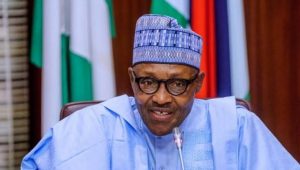
The Senate has raised alarm that with its approval of $22.7billion foreign loan request by President Muhammadu Buhari penultimate week, the total debt profile of Nigeria now stands at N33 trillion.
Speaking at the one day public lecture organised by the National Institute for Legislative and Democratic Studies ( NILDS), on Public Debt in Nigeria : Trend, Sustainability and Management in Abuja, the Deputy Chairman of Senate Committee on Local and Foreign Debts, Senator Muhammad Enagi Bima Enagi, All Progressives Congress, APC, Niger South, said borrowing had always served as veritable financial platforms for many countries of the world in running their economies.
According to him, judicious utilization of such loans for intended projects and servicing the debts appropriately have also been problems for some countries, particularly the developing ones as Nigeria.
This is even as the Director -General, Debt Management Office, DMO, Mrs Patience Oniha, expressed fears that economic effects of the coronavirus pandemic might incapacitate and frustrate Nigeria from servicing its debts appropriately.
Speaking further, Senator Bima noted that realities on ground in the country, in terms of required infrastructure and debt accumulations between 2006 and now, were not in anyway connected.
He, however, explained that many Nigerians were worried whenever they heard that their government was seeking one loan or the other.
He said: “From a low ratio of debt to gross domestic product (GDP) of about 3.4 percent at independence, Nigeria’s total public debt as at September 30, 2019, according to the Debt Management Office, DMO, stands at about N26.2 trillion (or $85.4 Billion).
“Of this amount, total domestic debts is about N18 trillion (or $58.4 Billion), which is 68.45percent of the total public debts. With the recent approval of the 2016-2018 External Borrowing Plan, the total debt stock would be about N33 trillion and 21% Debt/GDP ratio.
“The big question in the minds of average Nigerians aware of this fact is What did we do with the money? In other words, where did the money go?
“What do we have to show as a people for these huge debts accumulated over the last four decades or so?”
According to him, in stopping the ugly trend, the Senate and by extension, the National Assembly, is more than desirous to monitor the executive on prompt utilization of new loans being sought, to save the country from going back to the pre-2005 and 2006 debt burden era
Senator Bima said further: “The consequence of these borrowings is that the sheer magnitude of the Nations Annual Debt Servicing put at about N2.47 trillion for 2020 makes the provision of basic but essential amenities and infrastructure in the country almost impossible without further borrowings.
“Clearly, Nigeria needs to get its public finance in order to avoid the potential fiscal and financial crisis ahead of the nation.
“The current debt situation in Nigeria needs to be properly managed and every borrowed Naira or Dollar, carefully deployed, especially in the face of the continued dependence of the nation’s economy on exported crude oil, with its usual price volatility.
“Borrowings must be project-tied and not just to support budget deficit. Furthermore, the projects must be such to grow the economy and bequeath laudable infrastructure and not debt for future generations.’’
In her remarks, DMO Director-General, Patience Oniha, who was quick to say that there was no cause for alarm with regard to the total budget profile of the country which she puts at $85.390bn or N26trillion as at September 2019, said the country’s total debt stock as at 2006 when she exited the Paris and London Club of Creditors was $17.349million.
She, however, noted that annual deficit budgeting and poor revenue generation forced the country into taking loans which has accumulated to N26trillion as at September last year.
She said: “Concerns have been expressed about the growth in Nigeria’s debt stock since the exit from the Paris and London Club of Creditors.
‘’It is true that the public debt swtock has grown from US$17,349.69 million in 2006 to USD85,390.82 million as at September 30, 2019.
“However, it must be recognised that the current debt stock is the result of cumulative borrowings by successive governments to finance budget deficits and various infrastructure projects.”
Oniha explained that in order to ensure that the public debt was sustainable, the Debt-to-GDP Ratio was set at 25%, lower than the 56% advised by the World Bank and IMF, adding that the total public debt-to-GDP had remained within the 25% limit, standing at 18.47% in September 2019.
“This is however, only one measure of debt sustainability, the other equally important measure is the debt service-to-revenue ratio and this is where Nigeria needs significant improvement.
‘’Actual Debt Service to Revenue Ratio has been high at over 50% since 2015, although it dropped to 51% in 2018 from 57% in 2017. The relatively high Debt Service to Revenue Ratio is the result of lower revenues and higher debt service figures.
“Whilst Nigeria’s debt is sustainable, recent developments in the global environment induced by COVID -9, already suggest a less than favourable economic outlook with implications for Nigeria,” Oniha said.